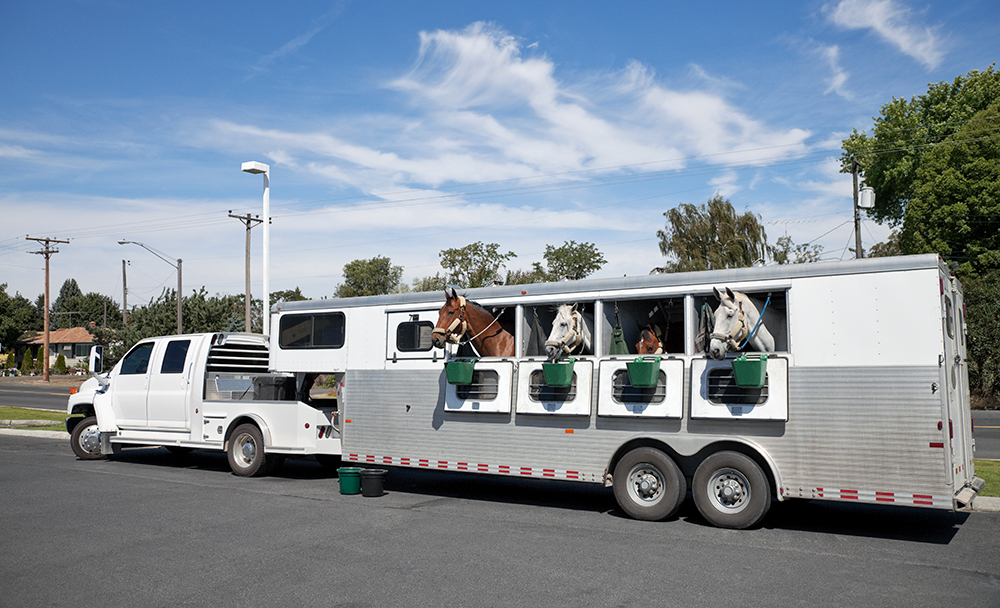Byron Reid, VMD
Many of our clients are preparing to ship to Florida for the upcoming season. A few things to keep in mind may help to reduce problems often associated with shipping.
It has been shown experimentally that there is a quantitative and qualitative reduction in a horses’ immune competence starting in as little as three hours following loading onto an equine transport vehicle. It follows that anything that can be done to limit the stress of transport or to prepare for it can help to mitigate this immunosuppression. For one thing, deworming, teeth floating, surgery and other stressful elective procedures, should be timed NOT to immediately precede shipping.

Regarding vaccinations, it makes sense to immunize in a timely fashion prior to shipping. Timely means close enough to departure to retain maximum protection and far enough in advance to have passed the stress and problems commonly encountered immediately following vaccination. Usually we are talking two to four weeks before transport.
Vaccines to consider are influenza, rhinopneumonitis, rhinitis, and strangles. The decision for vaccination against strangles must be weighed against the more substantial risks. The risks of the killed intramuscular strangles vaccines are exuberant local reactions and frequent abscesses. The modified live intranasal vaccine has been associated with local lymph node infections. Both types of vaccines are associated with relatively high risks of problems without offering solid, lasting protection. There might be some situations where vaccination is warranted especially if the perceived risk of strangles is high, but that is a decision you and your veterinarian must weigh carefully.
Traveling south to Florida also means year-round mosquito exposure, therefore protection against Eastern Encephalitis and West Nile viruses should be up-to-date. The newer West Nile vaccines are extremely effective and yearly vaccination is very likely adequate but Eastern Encephalitis vaccination associated protection is more short-lived and solid protection requires a more recent vaccination.
There are some horses that have a history of recurrent fevers and often respiratory infections following transport. Some of these horses may actually have pneumonia that has never been adequately cured and may benefit from a thorough veterinary examination and ultrasound assessment of their lung fields before shipping. Some of these horses, following careful consideration and consultation with your veterinarian, are placed on antimicrobials for transport. Immune modulators such as EqStim are sometimes also recommended prior to transport. Every horse is different and there are pros and cons for using modulators. A full discussion with your veterinarian is recommended in order to make the correct decision for your horse. Just as with vaccines, several weeks should be allowed to elapse following their use to allow the pyrogenic (heat producing) effect to subside and to allow any positive effect on the immune system to take effect.
Another concern for horses shipping long distance is their hydration status. It is common practice to stop to water horses periodically during transport or to hang water buckets if the trailer is set up to do so. In spite of this, however, some horses refuse to drink during transport. Some of these horses will nonetheless eat on a trailer or van and for these horses, Purina’s “Hydration Hay” (or some other product which is food-based but contains substantial water) can improve water intake during transport. These products might need to be introduced well in advance of transport to accustom horses to eating them.
We often get asked if it is better to ship straight through or with stopovers. I don’t know the answer to this but if stopping over is elected, it makes sense to take temperatures and if any fevers spike, veterinary treatment and possibly even an extension of the layover or local hospitalization for the affected horse(s) should be strongly considered.
Once your horse(s) have safely arrived at their destination, monitor temperatures, morning and evening, for three to seven days as some horses will not immediately show signs of travel related illness. Check to make sure regular eating and drinking patterns have been reestablished and that manure output is normal. If dietary adjustments have been made prior to travel, reintroduce regular diets slowly to decrease likelihood of digestive upset. Regardless of whether horses appear bright eyed and healthy following transport, allow sufficient downtime for adequate physical recovery from transport. Generally speaking, two to three-days rest for trips of 10 to 12 hours or longer with a gradual start back to regular exercise.
If you have questions prior to transport or if you have concerns upon your horse(s) arrival in South Florida, do not hesitate to give us a call. Our team’s first priority is always the same: the health and well-being of your horse.
Reid and Associates Equine Clinic is a full-service equine hospital and referral center located just minutes from Wellington’s Winter Equestrian Festival show grounds in Loxahatchee, Florida, specializes in preventive equine care as well as elective and urgent medical and surgical cases.
Emergency ambulatory calls and hospital admittance are available around the clock, 365 days a year. State-of-the-art diagnostics and treatments include a variety of options including orthopedic, colic and soft tissue surgery.
